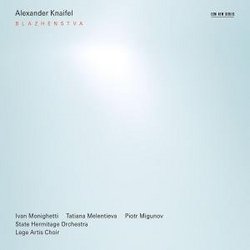Music that is blessed with heartbreaking beauty and inexplic
Christopher Culver | 10/21/2009
(5 out of 5 stars)
"ECM has featured the music of Russian composer Alexander Knaifel on several discs before, and this release from 2008 continues the label's attention on him. Knaifel (born 1943) was a promising cellist and student of Mstislav Rostropovich before an injury led him to dedicate himself solely to composition. Like other Soviet composers (Part, Gubaidulina, Schnittke, etc.) Knaifel began as a brazen modernist before adopting an overtly spiritual aesthetic.
Most of Knaifel's output on CD is from this later period, but here we get a rare recording of his music from the Sixties. "Lamento" for solo cello (1967) was a student work when Knaifel could still perform. The work is an abrasive atonal piece, somewhat similar to pieces of the same era by Silvestrov and Part, but the long silences and limited polyphony look ahead to the direction Knaifel took later.
"Blazhenstva" for choir and orchestra (1996) is a setting of the Beatitutdes and mature Knaifel at his best. The work begins with a slow series of piano notes played by the conductor. Each tone rings pure and is followed by a few seconds of powerful silence. A few voices of the choir intone the beginning of the text at low dynamic. Then the conductor, Ivan Monighetti, moves to his cello, the orchestra is first heard and the piece moves into heartbreaking beauty. As in "Amicta Sole" on the last ECM disc, Knaifel rarely involves more than two voices at a time, with a slow tempo and long-sustained notes. The sound, however, seems like cosmic energy. All text descriptions I can think of would suggest that Knaifel is another one of those mystical drone-based figures like Tavener or Gerrard whose music seems fluff, but Knaifel's music feels like it encompasses all creation in spite of its extremely limited means. I really wonder how he does it.
The pieces here exploit low dynamic, silence and hall acoustics to powerful effect. ECM is the perfect label for it. However, you'll need to have a good sound system and total silence around you to really experience Knaifel's work. ECM even stated in the press release for the album that, "Due to the very wide dynamic range of this recording, it is recommended to listen with headphones at a constantly high volume." As beautiful as it can be, I myself unfortunately listen to this disc less often than it deserves, because even crickets chirping outside can overwhelm it.
If you like the mystical Soviet composers, or figures like Radulescu who treat sound as energy, then Knaifel's work is worth encountering and, if you can hack the low dynamic, then BLAZHENSTVA is a fine introduction."

